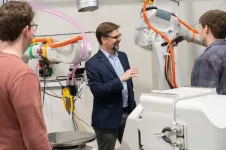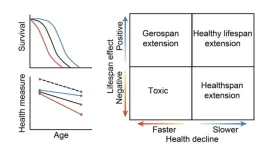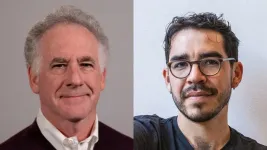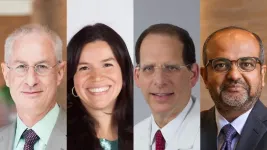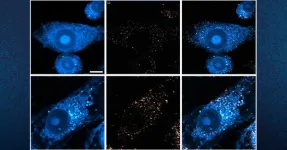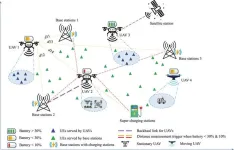(Press-News.org) LAWRENCE — Locations around the globe are experiencing climate disasters on a regular basis. But some of the most marginalized populations experience disasters so often it has come to be normalized.
A new study from the University of Kansas found residents of one Seoul, South Korea, neighborhood have grown so accustomed to living through extreme climate events they have developed a “disaster subculture” that challenges both views of reality and how social agencies can help.
Joonmo Kang, assistant professor of social welfare, spent a year living in Jjokbang-chon, an extremely impoverished neighborhood in Seoul, as part of an ethnographic research project. Residents there routinely live through extreme heat and cold in tiny, 70-square-foot units about the size of a closet. Over the course of a year, he interviewed residents about their experiences and worked with local social agencies to understand how they worked with the residents.
Residents regularly expressed a sort of indifference to extreme heat and climate change, stating they had no options or even that “every day is a disaster.” While that seeming difference with reality can potentially be caused by several factors, it shows that social work has a challenge in how to respond to climate disasters and their everyday effects, Kang said.
The study, published in the International Journal of Social Welfare, is part of Kang’s larger body of work in climate justice and eco social work. Through that lens, he said hopes to learn more about how climate change affects certain groups and populations and how social work can respond.
“For this paper I wanted to highlight the lived experiences of so-called slum housing in Seoul, South Korea, where I’m originally from,” Kang said. “But heat and climate disasters don’t just happen there, it happens throughout the Global North, even in the wealthiest countries. I want to see how this affects lives in the most marginalized communities.”
In his ethnographic study, Kang had informal conversations and semi-structed interviews with the residents of Jjokbang-chon. One resident reported how he simply sits still and tries not to move during the hottest times. Others reported they did not go to government-provided cooling centers because they were too far away and the effort to get there would outweigh riding out the heat.
“All year around, all four seasons are filled with distress; every day is a disaster. When every day is like that, when every day is a disaster, when our daily lives are a disaster, the weather doesn't matter. It's not like the summer or the winter becomes particularly hard,” one resident said.
Other residents reported living in a jjokbang was preferable to previous experiences of homelessness. Even though they were not allowed by landlords to install cooling systems beyond fans — and the facilities were not equipped to handle them — residents seemed resigned to accept living in extreme conditions.
“This research focused on how people make meaning of extreme weather. The findings revealed they developed a ‘disaster subculture,’” Kang said. “When they experience this, it causes them to reflect a sense of normalcy. One of the main things I found was even though it’s been widely reported these living conditions can be a living hell, people told me, ‘It is what it is.’ I was really struck by that.”
Building a tolerance to seemingly intolerable climate may be difficult to understand, but a community organizer who works with the Jjokbang-chon population offered insight into why residents may express such acceptance.
“It might also be their way of telling us, ‘I am trying my best to adjust,’ and at the same time even though they have a desire to get out of here, they might just be saying that because they don't have the resources or the means to turn things around,” the organizer said. “Being stuck in that situation for a long period of time, they might have gotten used to it or even built a tolerance because they can't change their reality, and as a result leads to a sense of acceptance, like a shrug of resignation.”
The field of social work has a responsibility, however, to serve the world’s most vulnerable populations, Kang writes, and understanding their lived experiences is key to doing so effectively.
Kang compared the situation to the boiling frog metaphor, in which a frog in a pot of slowly heated water does not jump out before it is cooked. People living in extreme conditions can be exposed to trauma for long periods, but unlike the frog, can offer insight into how to address the issue.
“Their own views of vulnerability and reality did not seem to align with what was objectively true. This shows we need to address the everyday reality and root causes and why people are living in these conditions.”
In ongoing and future work, Kang said he would further explore how to advocate for and empower marginalized communities to address climate issues that affect them every day.
“The folks who live these experiences know best. They have agency, and we need to listen to them,” Kang said. “I think it can be a waste of money and effort if we don’t listen to what people want and need and work with them to address climate-related issues.”
END
Marginalized communities developed 'disaster subculture' when living through extreme climate events, study finds
Findings show those hit hardest accepted conditions, despite realities; shows social welfare has role to play in addressing climate issues, researcher argues
2024-04-23
ELSE PRESS RELEASES FROM THIS DATE:
AGS honors Dr. William Hall with prestigious Nascher/Manning Award in Geriatrics
2024-04-23
New York (April 23, 2024) —The American Geriatrics Society (AGS) will honor William J. Hall, MD, MACP Emeritus Professor of Medicine at the University of Rochester this year with the prestigious Nascher/Manning Award, given biannually at the AGS Annual Scientific Meeting (#AGS24 will be held virtually May 9 – 11 (pre-conference days: Tuesday & Wednesday, May 7-8).
The Nascher/Manning Award was named in honor of Ignatz Leo Nascher, MD who was the first clinician to advocate for establishing a specialty focused on the care ...
Human Frontier Science Program: life science research addressing sustainability of living systems
2024-04-23
STRASBOURG, France, 23 April 2024 — Why do stressed bats shed more viruses? How do some key species engineer whole landscapes? How do humans and animals work in groups to solve problems, shape behavior?
These eight research projects are among the Human Frontier Science Program’s (HFSP) 93 Research Grant and Fellowship Awards recently announced to begin in 2024.
“HFSP has funded basic research in the life sciences for the benefit of humankind, and sustainability science spans some of the most complex research imaginable,” said HFSP Chief Scientific Officer Guntram Bauer. “These investigations examine highly interrelated living systems – many ...
Wind turbine blades get a sustainable upgrade
2024-04-23
The average wind turbine generates enough electricity in 46 minutes to power a home in the United States for an entire month, according to the United States Geological Survey. And with more than 70,800 turbines scattered throughout the country, wind power has now surpassed hydroelectric power as the largest producer of renewable energy.
With a $2 million grant from the Department of Energy, researchers from Virginia Tech are pioneering processes to make this sustainable energy source even more sustainable. The grant is part ...
New study uncovers lasting financial hardship associated with cancer diagnosis for working-age adults in the U.S.
2024-04-23
A new study led by researchers at the American Cancer Society (ACS) highlights the lasting financial impact of a cancer diagnosis for many working-age adults and their families in the United States. It shows a cancer diagnosis and the time required for its treatment can result in employment disruptions, loss of household income and loss of employment-based health insurance coverage, leading to financial hardship. When combined with high out-of-pocket costs for cancer care, nearly 60% of working-age cancer survivors report at least one type of financial hardship, such as being unable to afford ...
The coupling between healthspan and lifespan in Caenorhabditis depends on…
2024-04-23
“The ultimate goal of exploiting model organisms to screen for anti-aging interventions is to identify treatments that might translate to healthy lifespan extension in humans.”
BUFFALO, NY- April 23, 2024 – A new research paper was published in Aging (listed by MEDLINE/PubMed as "Aging (Albany NY)" and "Aging-US" by Web of Science) Volume 16, Issue 7, entitled, “The coupling between healthspan and lifespan in Caenorhabditis depends on complex interactions between compound intervention and genetic background.”
Aging is characterized by declining health that results ...
2 USC faculty members named 2024 Guggenheim Fellows
2024-04-23
USC faculty members Paul K. Newton and Nicolás Lell Benavides have been awarded prestigious Guggenheim Fellowships for 2024.
Newton, professor of aerospace and mechanical engineering and mathematics at the USC Viterbi School of Engineering, and Benavides, a lecturer at the USC Thornton School of Music, were chosen by the John Simon Guggenheim Memorial Foundation from nearly 3,000 applicants. They are among 188 inductees chosen this year for their excellence in scholarship and the arts.
“Humanity faces some profound existential challenges,” said Edward Hirsch, ...
4 USC faculty members named as fellows of prestigious science organization AAAS
2024-04-23
The council of the American Association for the Advancement of Science has elected USC faculty members Pinchas Cohen, Andrea Hodge, Jay Lieberman and Gaurav Sukhatme to the ranks of AAAS fellows.
The honor, which recognizes researchers whose “efforts on behalf of the advancement of science or its applications are scientifically or socially distinguished,” is among the most prized in academia.
The recognition honors excellence in research, technology, industry and government, teaching, and communicating and interpreting science to the public. The new cohort joins more than 40 of their USC peers already inducted into AAAS.
The newly elected AAAS ...
Innovative microscopy demystifies metabolism of Alzheimer’s
2024-04-23
Alzheimer’s disease causes significant problems with memory, thinking and behavior and is the most common form of dementia, affecting more than 50 million people around the world each year. This number is expected to triple by the year 2050.
Using their own state-of-the art imaging technologies, scientists at the University of California San Diego have now revealed how the metabolism of lipids, a class of molecule that includes fats, oils and many hormones, is changed in Alzheimer’s disease. They also revealed a new strategy to target this metabolic system with new and existing drugs. The findings are published in Cell Metabolism.
“Lipids ...
Toward unification of turbulence framework – weak-to-strong transition discovered in turbulence
2024-04-23
Turbulence is ubiquitous in nature. It exists everywhere, from our daily lives to the distant universe, while being labelled as “the last great unsolved problem of classical physics” by Richard Feynman. Prof. Dr. Huirong Yan and her group from the Institute of Physics and Astronomy at the University of Potsdam and DESY have now discovered a long-predicted phenomenon: the weak-to-strong transition in small amplitude space plasma turbulence. The discovery was made by analyzing data from ESA’s Cluster mission – a constellation of four spacecraft flying in formation around Earth and investigating how the Sun and the Earth interact.
The ...
Innovative GREENSKY model elevates UAV efficiency in next-gen wireless networks
2024-04-23
Researchers from the University of Missouri-Kansas City, School of Computing and Engineering, and independent researchers have developed a groundbreaking model, dubbed GREENSKY, that significantly enhances the energy efficiency and operational time of Unmanned Aerial Vehicles (UAVs) in cellular networks.
In the ever-evolving landscape of wireless communication, UAVs play a pivotal role, especially in rural, remote, and disaster-struck areas where traditional network infrastructure is absent. ...
LAST 30 PRESS RELEASES:
Antifibrotic drug shows promise for premature ovarian insufficiency
Altered copper metabolism is a crucial factor in inflammatory bone diseases
Real-time imaging of microplastics in the body improves understanding of health risks
Reconstructing the world’s ant diversity in 3D
UMD entomologist helps bring the world’s ant diversity to life in 3D imagery
ESA’s Mars orbiters watch solar superstorm hit the Red Planet
The secret lives of catalysts: How microscopic networks power reactions
Molecular ‘catapult’ fires electrons at the limits of physics
Researcher finds evidence supporting sucrose can help manage painful procedures in infants
New study identifies key factors supporting indigenous well-being
Bureaucracy Index 2026: Business sector hit hardest
ECMWF’s portable global forecasting model OpenIFS now available for all
Yale study challenges notion that aging means decline, finds many older adults improve over time
Korean researchers enable early detection of brain disorders with a single drop of saliva!
Swipe right, but safer
Duke-NUS scientists identify more effective way to detect poultry viruses in live markets
Low-intensity treadmill exercise preconditioning mitigates post-stroke injury in mouse models
How moss helped solve a grave-robbing mystery
How much sleep do teens get? Six-seven hours.
Patients regain weight rapidly after stopping weight loss drugs – but still keep off a quarter of weight lost
GLP-1 diabetes drugs linked to reduced risk of addiction and substance-related death
Councils face industry legal threats for campaigns warning against wood burning stoves
GLP-1 medications get at the heart of addiction: study
Global trauma study highlights shared learning as interest in whole blood resurges
Almost a third of Gen Z men agree a wife should obey her husband
Trapping light on thermal photodetectors shatters speed records
New review highlights the future of tubular solid oxide fuel cells for clean energy systems
Pig farm ammonia pollution may indirectly accelerate climate warming, new study finds
Modified biochar helps compost retain nitrogen and build richer soil organic matter
First gene regulation clinical trials for epilepsy show promising results
[Press-News.org] Marginalized communities developed 'disaster subculture' when living through extreme climate events, study findsFindings show those hit hardest accepted conditions, despite realities; shows social welfare has role to play in addressing climate issues, researcher argues
